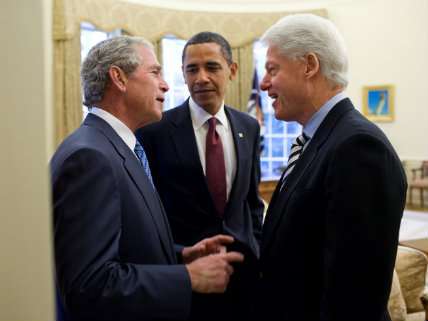The End of Policy
America's political parties have reached the end of their agendas.

Washington is in a post-policy moment. Congress passes little of substance. Few bills make it to a vote, and those that do are intended as messages, symbols, or stunts, rather than policy reforms. The president makes speeches gesturing toward policy reforms, but they largely repackage old ideas. The true subtext of those speeches, meanwhile, has less to do with the policies themselves and more to do with the gridlock and obstructionism that the Obama administration sees as blocking legislative advances. The last presidential campaign was not fought over new ideas and initiatives, but over policies past. A vote for Romney was a vote to undo the big-ticket policy measures of Obama's first term. A vote for Obama was a vote to keep them, and try to make them work.
The stasis has not escaped notice. And a convenient conventional wisdom has developed, blaming Republican party obstructionism for refusing to cooperate with Democrats to get the gears of legislation turning again. GOP obstructionism is not imaginary, but this self-serving narrative misses the point. It is not unreasonable for Republicans to decline to cooperate on an agenda they do not support. And if it seems like they rely heavily on blocking tactics, that is because, as a minority party that controls one half of Congress, they have few other tools at their disposal. Republicans can stand in the way. And so they do.
No, the real problem is that Republicans do not have a policy agenda of their own. They have opposition to the president, and a lingering taste for tax cuts, defense spending, and domestic surveillance. And that's about it.
Democrats have ridiculed Republicans for their limited agenda. "Feel a cold coming on? Take two tax cuts, roll back some regulations, and call me in the morning," President Obama quipped at last year's Democratic convention. But they too are stuck in a rut. Yes, as the party of activist government, there is always something more to be done. But the president's party seems nearly as drained of policy energy as the GOP, resting on recycled ideas and expansions of existing programs.
This is what really lies underneath the recent policy stagnation—not obstructionism, but exhausted party agendas with nowhere left to go. The truth is that both parties have largely achieved their long-term policy goals. And neither has a strong sense of what to do now.
Over the past four decades, the GOP has effectively ensured that relatively low marginal tax rates and spectacularly high levels of defense spending are all enshrined in American politics. Sweeping federal surveillance of civilian communications is entrenched in the government. Bush-era military adventurism has survived a Democrat in the White House. Drone strikes in foreign countries continue. We're still at war.
Democrats, meanwhile, have successfully defended and expanded the entitlement state. Near-universal health care, the holy grail of the American left, is at hand, and the administrative state has grown large and unaccountable. The most recent Republican presidential nominee ran against Democratic cuts to Medicare.
Yes, both parties have made sacrifices along the way. And of course, there is still more both parties say they would like to accomplish. But it's more of the same. The parties are like middle-aged couples who find themselves in the jobs they always wanted, the homes they hoped they'd have, or at least pretty close. There are still new projects to run and renovations to complete, taxes to be cut and programs to be expanded, but the task is no longer to build toward something. It's to defend what's already been done.
One key difference between the two parties, however, is that some Republicans have realized that they are spinning their wheels, and are looking for a way to escape. Hence the various factions vying for a new path forward: Libertarian populists, conservative reformers, neocon revivalists, security-state skeptics, other right-leaning entreprenuers all start from a shared assumption that the Republican party's policy ammunition is largely spent. The party needs a new story, a new framework, and new ideas to drive it.
Democrats, on the other hand, have not yet taken stock of their situation. But already Obama's second term resembles a once-promising TV series stretched over far too many seasons. Like so many Republicans in the Bush years, there is widespread belief amongst Democrats that they are ascendant. But much like Republicans during Bush's second term, they are already running out of steam. Hillary Clinton, the party's most likely presidential nominee in 2016, is intimately linked to the two previous Democratic administrations, and will run as a defender of their achievements. Beyond Clinton, the party's bench is weak. It won't be long before Democrats are as exhausted as Republicans are now.
The end of policy is not permanent. For better or for worse, both parties will eventually settle on new directions and new agendas, perhaps modified only slightly from their old ones, perhaps radically changed. But first, both parties will have to figure out what it is they want, and what they stand for. Republicans, having had an earlier start, are beginning this process, however slowly. Democrats have yet to begin.


Show Comments (52)